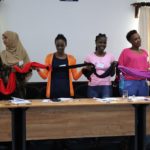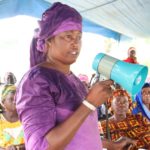The first ever The Girl Generation Festival (TGGFest 2022) was held in Nairobi, in October 2022 to commemorate both World Mental Health Day and International Day of the Girl.
This year’s theme titled ‘make mental health and well-being for girls and women a global priority’ was anchored on World Mental Health Day and brought together over 10 partners including the Chopra Foundation and its affiliates, Seva.Love and NeverAlone.
The festival’s main objectives were:
- Provide adolescent girls and women with resources and opportunities to rebuild their social networks and have their voices equally heard and valued to increase their agency,
- Use therapeutic arts as a form of expression toward mental and emotional well-being for girls and women.
As mental health continues to affect many individuals across the globe, especially in the activism space, there is a need to provide access to mental health services and support to survivors, activists, and allies who work to end Female Genital Mutilation/Cutting (FGM/C) and all forms of violence against women and girls.
Survivors and activists of FGM/C and Gender-Based Violence (GBV) often face numerous challenges to their emotional well-being, particularly when working in resource-poor settings with a high need for support for girls and women from underserved communities. Additionally, survivors often face stigma, alienation, and threats to their safety, making it hard for them to open up.
LISTEN, BELIEVE, AND SUPPORT!

“African girls need to be taught how to love themselves.” Joy Zawadi, Interim Executive Director for Akili Dada
“As survivors-activists and girl allies, we need to acknowledge our hurt to heal and unpack our traumas. It’s also important for girls to forgive their abusers and for girl allies to create meaningful and healthy spaces for girls centered approaches around their wellbeing”, Said Mumina, an end FGM/C activist.
“The covid-19 pandemic increased the surge in early marriages and FGM/C cases due to families losing economic stability. Unfortunately, as families gain, girls remain on the losing end. They are often told to persevere in situations such as abusive marriages, GBV, and FGM/C. African girls are taught not to love themselves. As girl allies, we have the power to reshape our cultures for girls and young women. We must challenge ourselves with the cultures that need to change as we think about education and support systems for girls and young women. And let’s always remember that gender equality begins with us watching our words,” Joy Zawadi, Interim Executive Director Akili Dada.
“Communities have the role of empowering girls from a young age as it influences who they become when they transition into adulthood. Gender equality begins at home. Girls have the power to lead not because of their gender but because they can lead,” Jane Njogu, County Director of Education- Narok County.
SURVIVOR LEADERSHIP TRAINING
The Girl Generation-Support to the Africa-led Movement to End FGM/C runs the Survivor Leadership Training (SLT). The training aims to:
- Provide sustainable emotional support and funding for women and girls affected by FGM/C, in order to enhance prevention efforts and support survivors
- Fill the gap for survivor’s leadership, in the end, FGM/C movement by equipping and empowering survivors to become leaders.
- Ensure self-care for survivors working to end FGM/C, and
- Break down the stigma associated with FGM/C and associated emotional/mental health issues
This year, the training has reached 20 survivors in over 18 counties in Kenya.
“Programs like Survivor Leadership Training have created platforms where survivors have access to mental health services, resources, and tools on accessing funds, and how to run their organizations. Through the program, survivors can identify a safe space and what it would look like for them. The program is also keen on breaking the stigmas around FGM/C while educating women and girls on the mental effect of FGM/C. Activists who work with survivors also need to prioritize their mental and create self-care practices for their well-being,” Dr. Leyla Hussein OBE, Global Advocacy Director and Deputy Team Leader for TGG-ALM.
Deepak Chopra, the founder of Chopra Foundation joined the event virtually and took participants through a meditation process. Chopra Foundation seeks to engage with the TGG-ALM programme to provide resources for health and spirituality for disadvantaged individuals and communities through mind and body spiritual healing, education, research and fundraising for selected projects.
SCARS TO STARS PHOTO EXHIBITION

Participants walk through the photo exhibition which featured potraits of survivors of FGM/C from 15 hotspot counties in Kenya.
The Girl Generation in collaboration with AfyaAfrika and photographer Godson Salman, showcased the Scars to Stars Project for the first time during the TGG Fest. The portrait exhibition featuring FGM/C survivors sought to broaden public awareness to create a new positive dialogue about ending FGM/C. The exhibition aims to give exposure to the rights of girls and women who should be empowered to speak about FGM/C and provide them with a platform to break the cycle and become agents of change. The exhibition features young survivors of FGM/C from 15 FGM/C hotspot counties of Kenya. Many of them work at the community level, within their own towns and villages, starting with conversations about the practice, hold educational sessions, help girls who are at risk (and, indeed, other human rights violations), and support other survivors.
“As a survivor and activist, I am inspired to fight for eliminating FGM in my community because I don’t want other girls to go through what I went through. In the Maa community, it is still considered a taboo for women to speak up in their communities. However, we must continuously empower girls/activists to speak up against harmful practices. Unfortunately, our communities expect us to keep quiet, robbing us of our voices and identities while leveraging on culture and religion as an excuse.” Catherine Mootian- Founder and Director, AfyAfrika, Narok County.
Amran Ali- Activista Garissa commented about the photo exhibition and said, “cultural practices such as the Maslaha issue is used within the Garissa community to prevent girls from speaking up while encouraging perpetrators to continue harming girls. Being an advocate in my community has encouraged girls and women to stand up and speak out against their lived experiences in the name of culture.”
Binti from Tanzania said, “let’s encourage girls to speak up against harmful cultural practices they face in their communities while connecting them with platforms and young women and activists they can look up to as positive role models. We also need to teach girls to love themselves,” Binti Salha, founder Binti Salha Aziz Foundation.
VOICES FROM GIRLS AND ACTIVISTS

Maureen Waititu, a Kenyan Social Media influencer shares her story of triumph over mental illness
“The event was great. I really liked the stories the survivors shared and how they are helping in reshaping their communities. They were all incredible stories, and I was touched by them. The bravery and the courage of the storytellers inspired me to want to do more research on the matter and create awareness back at home. The program was free and open- it gave me the safe space to air my opinion and learn from the many opinions of everyone else in the room, which was educative and informative.” Jacinta- Akili Dada Foundation.
“When we overlook statistics, it brings about the conversation of girls being over-empowered compared to boys. However, that is not the reality, for example when we look at KSCE results where girls end up being up half of the top ten students, we often overlook the bigger picture that out of the top 100, only 37 are girls,” Velma Muhatia, Akili Dada alumnae.
“Influencers passionate about mental health are now leveraging their platforms to advocate for access to mental issues affecting women such as GBV and mental health, using their voices for positive impact. Access to mental health services is also important for girls and women as it helps them heal from their traumas,” Maureen Waititu, Social Media Influencer- Better4Kenya.
The TGGFest 2022 attracted over 120 participants from 15 counties in Kenya and 4 countries in Africa- Kenya, Ethiopia, Malawi, and Tanzania.



